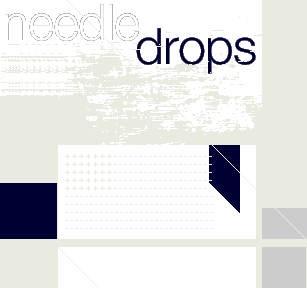


++ Needle Drops is now an occasional music column that a number of Neumu writers take turns writing. All columns prior to March 2004 were written by Philip Sherburne.
++ Recently ++
Tuesday, November 29, 2005 = The Stooges Unearthed (Again)
Tuesday, November 8, 2005 = Documenting Beulah And DCFC
Tuesday, November 1, 2005 = Out-Of-Control Rock 'N' Roll Is Alive And Well
Tuesday, October 25, 2005 = Just In Time For Halloween
Monday, October 3, 2005 = The Dandyesque Raunch Of Louis XI
Monday, August 15, 2005 = The Empire Blues
Tuesday, August 9, 2005 = David Howie's Sónar Diary
Monday, July 25, 2005 = Hot Sounds For Summertime
Monday, June 27, 2005 = Overcoming Writer's Block At Sónar 2005
Monday, June 4, 2005 = Cool New Sounds To Download Or Stream
++ Needle Drops Archives ++
View full list of Needle Drops articles...
|
|
 |
Monday, May 30, 2005
++ On The Rebound With Gimme Fiction
By Jennifer Kelly
++ If you're like most music lovers, your reaction, when you first play a
record you're going to love, is, "That was awesome. I can't wait to play
it again." If you happen to review records with any regularity, you may
have a slightly different response, more along the lines of, "Hmm, that was
good; only five more repeats and I can write about it." There's a constant
rush to judgment, a feeling that the very instant you can put together two
or three coherent thoughts (and sometimes, unfortunately, a day or two
before that), you should stop listening and get your damned review finished.
I'm not complaining. Writing reviews is one of the most fun things I do in
my life, and it has exposed me to more great music than anyone has a right
to hear. Still, the process, the timetable, the need to say something
skews the whole experience of listening. You're done at the exact moment
you start to really appreciate a record, and life being what it is, you're
probably not going to spend much time with it afterwards.
So, it was unusual when, a couple of weeks ago, with my review of Spoon's
Gimme Fiction safely filed, I felt a need, almost a craving, to hear
it again. I've been thinking about why that would be — and how that
additional listening has changed the way I perceive the album.
++ To start with, I'm still not entirely sure what made Gimme Fiction
such a magnet for me. It's not just quality, though this is clearly one of
the year's strongest recordings. But that's not enough by itself. Other
similarly excellent records — Dead Meadow's Feathers, for instance,
or The Evens self-titled debut — have languished on the shelf since their
deadline passed. And it's not just the appeal of procrastination, as
listening to "Sister Jack" another six times took the place of diving into
next week's assignment — though of course that played a role. It may have
been partly because one of these songs wasn't completely new to me — a
demo version of "I Summon You" put up on Spoon's Web site got obsessive
repeat play on my iPod most of last fall and winter. ("Sister Jack" was
available in rough form as well, but I never downloaded it.) But I don't
think that one song's near-Top 40 familiarity can explain my
interest. I wanted to hear the whole album, over and over.
The most appealing theory, at least at the moment, has to do with the gaps
in music. Gimme Fiction is an album that takes you over the jumps;
you clear its elliptical lyrics and sparse instrumentation by, to some
extent, filling in the blanks yourself. You have to work harder, I think,
to pull the pieces together, because Spoon singer/guitarist/writer Britt Daniel
has ferociously edited out superfluities and self-explanations. There's a narrative
arc to each of
these songs, a wiry musical continuity, but it's never obvious in the
way that, say, Wilco songs or The Wrens songs can be. It's like finally
learning how to play a difficult couple of measures in some piano piece
you're learning. The hardest-won passages become your favorites just
because you had to work for them. In a sense, Daniel's songs are the Rules
girls of the pop universe, refusing to give it up to you until you've spent
serious, serious time with them, and even then you're never sure you've
gotten to them.
++ So, OK, I've been listening hard — what have I learned? To begin with,
I've started to question my whole assumption that Gimme Fiction is a
minimalist work. Yes, there is plenty of white space in its music. For
example, I picture the space between Eddie Robert's ominous staccato bass
and drummer Jim Eno's stark beat in "Was It You" as the gap between battery
poles, cracking with visible electrical energy. In the same way, the
clipped off-beats of "I Turn My Camera On" leave unsettling gaps. Daniel's
sleek falsetto skitters over them, but doesn't even them out. It's the
contrast between abrupt rhythms and pop-soul smoothness that makes this
song so arresting.
Yet, once you spend time with them, you realize that many of these songs
aren't minimalist at all. They're just extremely disciplined, applying
dizzying layers of sound in very short bursts. Blink and you'll miss the
wail of feedback slipped into "The Beast and Dragon Adored," but, despite
its brevity, it completely changes the song. Or, once you're totally sure
you grasp the simple pop-rock glory of "Sister Jack," listen again and
notice how the pared-away chorus melts into effects-heavy experimentation
and altered vocals. Even the most accessible song on the album is much
less simple than it appears. And don't even get me started on "My
Mathematical Mind," with its almost subliminally quick slashes of strings
and cut-off cymbal clashes. The instrumental break would be symphonic if
it were not so tightly contained, its abbreviated piano lines and tense
drums bouncing off a caffeinated blend of strings, brass and horns. This
is an everything-but-the-kitchen-sink style arrangement that is so
rigorously thought out that it sounds minimal.
I'm also starting to wonder whether Spoon is pop at all. There's very
little concern with the "I met you. I want you. I love you. I'm losing
you" story line that defines most pop songs. The lyrics are concerned,
more than anything, with the difficulty of making music. I'm sure people
will make out in cars with Spoon playing, that certain couples will
nominate "Sister Jack" or "I Summon You" as their song, but it's a
stretch. These are not romantic songs. They are tough, spiky, eccentric
songs, edited to their bare essence, nonlinear and opaque. "I got something
to tell you/ Far outside the black and the white/ Aw I got something to tell
you/ But who will receive it tonight," sings Daniel in "The Infinite Pet,"
and you get the sense that while lots of people may think they
understand what he's talking about, he's got his doubts about them.
++ So, again, I finish writing about Gimme Fiction, again, probably,
having failed to absolutely get a handle on it, again having left untouched
a dozen or two elements of its complicated appeal. I wouldn't be surprised
if, in a day or a week or a month, I'm returning to it. It's that kind of
record.
|
| |
|